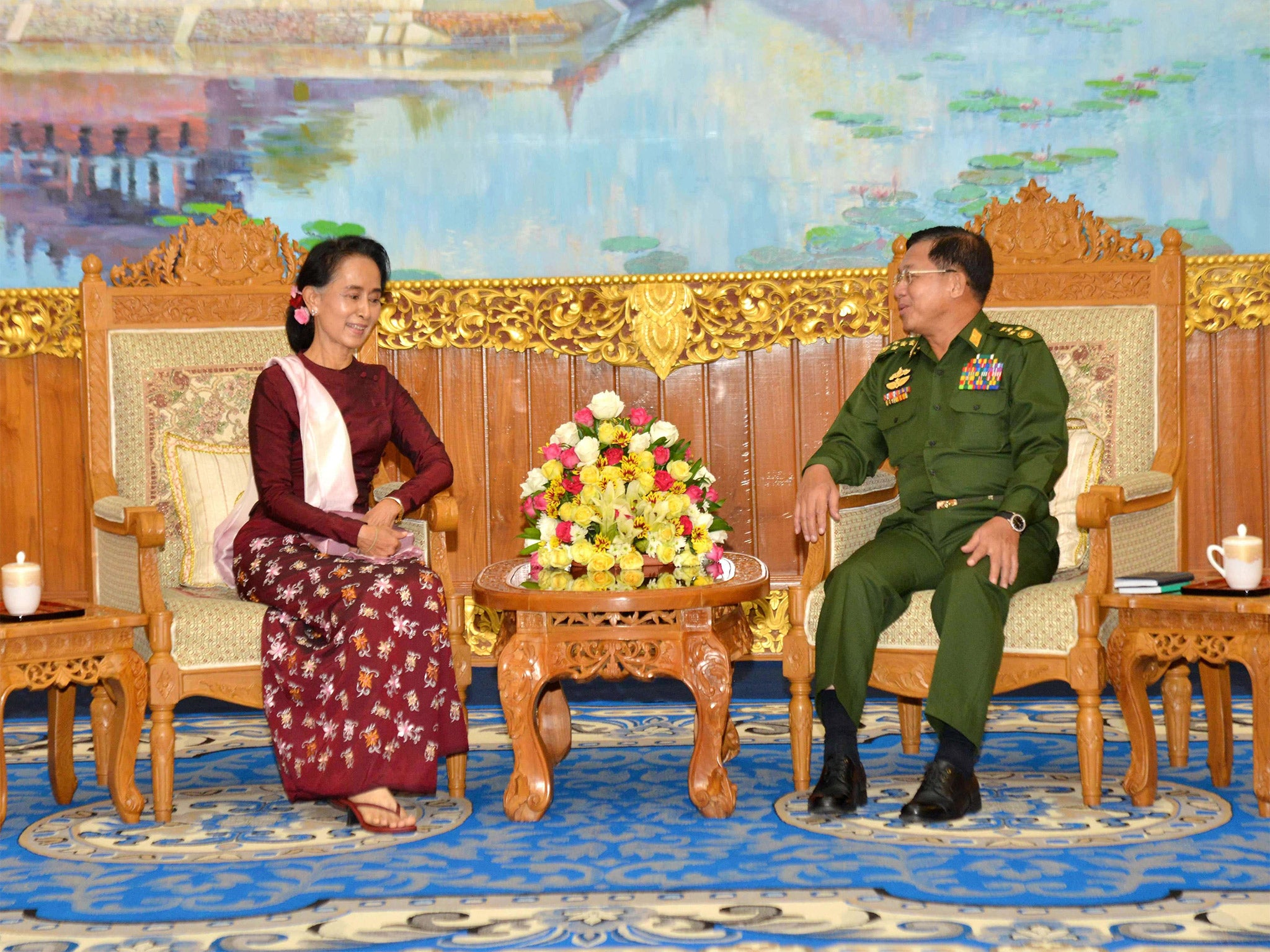Burma election: Aung San Suu Kyi edges closer to power after first meeting with army chief - a month on from landslide victory
Meeting indicates that the military regime have decided to swallow their democratic medicine and allow the results of the poll to lead to a peaceful transition of power for the first time in the country’s 70-year history

Your support helps us to tell the story
From reproductive rights to climate change to Big Tech, The Independent is on the ground when the story is developing. Whether it's investigating the financials of Elon Musk's pro-Trump PAC or producing our latest documentary, 'The A Word', which shines a light on the American women fighting for reproductive rights, we know how important it is to parse out the facts from the messaging.
At such a critical moment in US history, we need reporters on the ground. Your donation allows us to keep sending journalists to speak to both sides of the story.
The Independent is trusted by Americans across the entire political spectrum. And unlike many other quality news outlets, we choose not to lock Americans out of our reporting and analysis with paywalls. We believe quality journalism should be available to everyone, paid for by those who can afford it.
Your support makes all the difference.Almost a month after winning a landslide victory in Burma’s general election, a beaming Aung San Suu Kyi had her first one-on-one meeting with the most powerful man in the country – army chief Senior General Min Aung Hlaing.
The general, who took over from former dictator Senior General Than Shwe in 2011, smiled broadly as he greeted the chairwoman of the National League for Democracy (NLD) outside army headquarters in the capital, Naypyidaw, and escorted her inside.
The two spoke privately for more than an hour before the general ushered her out. A terse, two-paragraph statement following the meeting said: “Both sides agreed to follow the people’s wish to collaborate for the country’s stability, rule of law, national unity and development.”
The meeting followed a 45-minute encounter in the morning between Ms Suu Kyi and President Thein Sein, the former general who in 2011 began the reform process that enabled the NLD to fight last month’s election in which the party he heads, the Union Solidarity and Development Party (USDP), a proxy for the army, won just over one-tenth the number of seats won by the NLD, gaining a mere 6.4 per cent of the total vote.
The two largely ceremonious meetings indicate that the army and its political proxy have decided to swallow their democratic medicine and allow the results of the election to lead to a peaceful transition of power, which would be the first such hand-over in Burma’s nearly 70-year history.
Ye Htut, President Thein Sein’s spokesman, who attended the meeting with his leader, told reporters: “The main point… was to talk about a smooth transition and transfer of power to the newly elected government and to discuss mutual co-operation in the future.”
Another goal, he said, was “to ease people’s concerns”. He added that the two leaders “talked about establishing a new tradition that has never existed before in Burma: how to transfer the duties of the head of state systematically”.
Ms Suu Kyi requested the meetings with the two top men on 11 November when her party’s triumph became clear, but it was only this Monday that they granted her an appointment. The apparently languid progress towards the handover reflects the constitutional stipulation – described by Ms Suu Kyi as “silly” – which requires the incumbent government to remain in office until late March, by which time the new parliament will have met to elect the new president, in whom executive power is vested.
But the “silliness” of the constitution is only one of Ms Suu Kyi’s problems with it, and since becoming an MP she has made it clear that she urgently wants to amend it. Others issues include the fact that it awards a quarter of parliamentary seats to unelected soldiers, who attend in uniform; that the army retains control of key ministries including home and defence; and, crucially, that it bars from presidential office anyone whose spouse or children hold foreign passports.
Ms Suu Kyi is thus barred from becoming president on account of her two half-British sons. She has suggested that she will get around that problem by ruling “above” the President, with a proxy figure in the office who will answer to her.
She is said to have decided who that person is to be, but the identity remains a secret. Speculation on the question is rampant.
Join our commenting forum
Join thought-provoking conversations, follow other Independent readers and see their replies
Comments